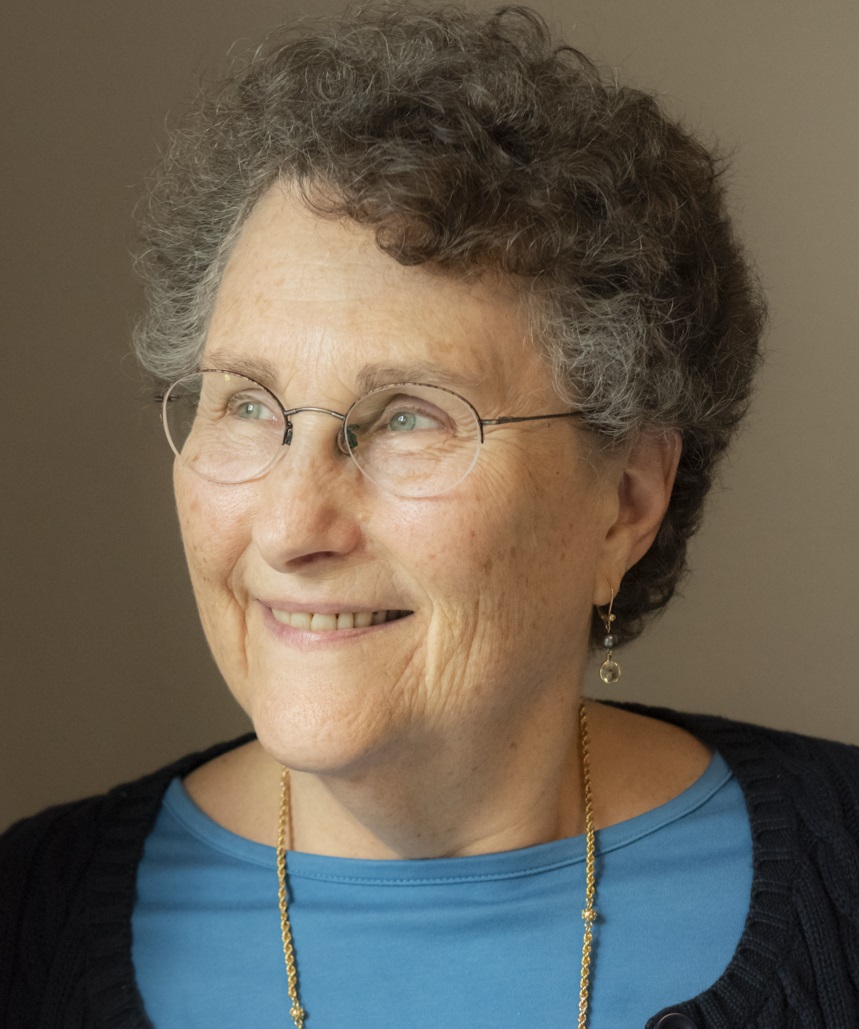Friendship, loneliness, and prayer: Saying “thank you” to friends
Lynne Baab • Tuesday October 10 2023

I learned about polite, dutiful gratitude in childhood, and I’m grateful for those lessons. David Steindl-Rast, a Benedictine monk, taught me something new about expressing thanks in his book, Gratefulness: The Heart of Prayer. Brother Steindl-Rast emphasizes the relational component of thankfulness: “When I acknowledge a gift received, I acknowledge a bond that binds me to the giver. . . . The one who says ‘thank you’ to another really says, ‘We belong together.’ Giver and thanksgiver belong together” (pages 15-17).
A simple “thank you” tells the other person that I value what they have contributed to my life. I value my relationship with them. I want to be connected to them.
Recently I was in a situation where I helped someone with something that seemed straightforward to me. This person thanked me over and over. I could tell my help made them acutely uncomfortable. Perhaps that discomfort came from the fact that they were ashamed to admit they needed help. I don’t know for sure. After the second or third thank you, the person was no longer indicating, “We belong together.” Instead, they seemed to communicate, “I am uncomfortable with your help. I don’t want to be needy.” To some extent, the multiple expressions of gratitude seemed to say, “I don’t want to need you in particular. I’m totally embarrassed to be in this relationship in this way.” These thank yous communicated no intimacy, pretty much the opposite of what Brother Steindl-Rast describes.
This week, I want to encourage you to ponder the way you express gratitude in friendships and other relationships. Do you like to “acknowledge a bond that binds me to the giver”? When you say thank you, are you saying, “We belong together?” You may want to pray about the answers to these questions and how you want to move forward.
You may resonate with Steindl-Rast’s idea of the connection between giver and thanksgiver. If so, probably the main form of prayer you need to engage in is asking for wisdom in expressing gratitude wisely and well. If you are embarrassed by receiving help, your prayers may need to go deeper to the place of acknowledging that we all need help. You may need God to impress on your heart that giving and receiving help — as well as the gratitude that accompanies helping — are part of healthy and loving relationships.
You also may want to pray for God’s wisdom about the best form to use when expressing thanks. One of the discoveries I made when doing my Ph.D. studies in communication 17 years ago is the way that communication has become so individualized. We need to acknowledge this and ask God for perception and wisdom. Some people never listen to their voicemail. Some people don’t read their emails. Some people prefer personal messages within a social media site and reserve regular email for work. Some people love gifts that express thanks. I once sent a thank-you card to a young adult. Later I learned that he checks his physical mail only once every month or two, when the mailbox at his apartment building gets jammed full. Despite my commitment to targeting my communication to the receiver, I didn’t know until then that some people don’t check their physical mail regularly. If we want to express gratitude, we need to consider the options that are appropriate for the person we want to thank, including text messages, voicemail, voice messages sent as a text, email, message within a social media platform, in person, in a written note or card, or in a note attached to a gift.
Expressing thanks matters. The Bible is full of statements of gratitude to God. You can read through any ten psalms in a row, and I bet you’ll find a dozen or more statements of thankfulness. My husband and I used Colossians 3:12-17 as one of the readings at our wedding, and part of the reason we chose it is that being grateful/thankful is mentioned three times.
My experience with the person who thanked me over and over, and who so obviously felt uncomfortable receiving help, is instructive. If we feel uncomfortable thanking human beings who help us or give us something, will we also find it hard to thank God? If we feel that receiving help and giving thanks shows we are too needy, will we also find it hard to accept that we need God’s help every moment of every day? You may want to go back to the beginning of this post and read the quotation from Brother Steindl-Rast again in the light of giving thanks to God. When we thank God, we affirm so many things about Jesus’s friendship with us and the Holy Spirit’s guidance and empowerment, including our dependence on God for every breath.
Thanking God helps us learn to thank humans. Thanking humans helps us grow in thanking God. Expressing gratitude honestly and humbly nurtures our bonds with friends, family members, colleagues, neighbors, and the God who calls us “Beloved.”
O Giver of every good gift, open our hearts to receive your love and the love of friends and family members. Help us express gratitude frequently and humbly in a way that nurtures our relationships. Help us say thank you in a form that people can easily receive. Help us notice your generous gifts to us so we can give you our thanks often.
(Next week: The listening skill of reflection as a way to discern if we understand. Illustration by Dave Baab: Victorian house on Highgate, Dunedin, New Zealand. If you’d like to receive an email when I post on this blog, sign up below under “subscribe.”)
A few years ago I wrote a series of blog posts called “The friendship skills of asking, giving, and thanking.” The rest of the posts follow after the first post.
Here’s another related post you may enjoy: Thankfulness versus optimism
Next post »« Previous post
Subscribe to updates
To receive an email alert when a new post is published, simply enter your email address below.

Lynne M. Baab, Ph.D., is a teacher and writer. She has written numerous books, Bible study guides, and articles for magazines and journals. Lynne is passionate about prayer and other ways to draw near to God, and her writing conveys encouragement for readers to be their authentic selves before God. She encourages experimentation and lightness in Christians spiritual practices. Read more »
Lynne is pleased to announce the release of her book on grief and gratitude, designed to help people grieving from anything, including the pandemic, while also desiring to notice God's good gifts. Two Hands: Grief and Gratitude in the Christian Life is available in paperback, audiobook, and for kindle. Lynne's 2018 book is Nurturing Hope: Christian Pastoral Care for the Twenty-First Century, and her best-selling book is Sabbath-Keeping: Finding Freedom in the Rhythms of Rest (now available as an audiobook as well as paperback and kindle). You can see her many other book titles here, along with her Bible study guides.
Lynne recently spoke about empathy and also about bringing spiritual practices to life.
Lynne was interviewed recently for the podcast "As the Crow Flies". The first episode focuses on why listening matters and the second one on listening skills.
Here are two talks Lynne gave on listening (recorded in audio form on YouTube): Listening for Mission and Ministry and Why Listening Matters for Mission and Ministry.
"Lynne's writing is beautiful. Her tone has such a note of hope and excitement about growth. It is gentle and affirming."
— a reader
"Dear Dr. Baab, You changed my life. It is only through God’s gift of the sabbath that I feel in my heart and soul that God loves me apart from anything I do."
— a reader of Sabbath Keeping
Subscribe
To receive an email alert when a new post is published, simply enter your email address below.
Featured posts
- Drawing Near to God with the Heart: first post of a series »
- Quotations I love: Henri Nouwen on being beloved »
- Worshipping God the Creator: the first post of a series »
- Sabbath Keeping a decade later: the first post of a series »
- Benedictine spirituality: the first post of a series »
- Celtic Christianity: the first post of a series »
- Holy Listening »
- A Cat with a Noble Character »
- Welcome to my website »
Tags
Archive
- April 2024 (4)
-
March 2024 (5)
- Friendship, loneliness, and prayer: Praying about distractions from empathy
- Friendship, loneliness, and prayer: Praying to keep empathy flowing
- Friendship, loneliness, and prayer: Everyday initiative
- Friendship, loneliness, and prayer: Praying for guidance for ending conversations
- Friendship, loneliness, and prayer: Reflecting on the series
- February 2024 (4)
- January 2024 (2)
-
December 2023 (6)
- Friendship, loneliness, and prayer: Initiating
- Friendship, loneliness, and prayer: Praying about listening roadblocks
- Friendship, loneliness, and prayer: Praying to love the poverty in our friends
- Friendship, loneliness, and prayer: Praying for “holy curiosity”
- Friendship, loneliness, and prayer: Praying for “holy listening”
- Friendship, loneliness, and prayer: Praying to give affection extravagantly
- November 2023 (4)
-
October 2023 (5)
- Friendship, loneliness and prayer: A listening skill with two purposes
- Friendship, loneliness, and prayer: Saying “thank you” to friends
- Friendship, loneliness, and prayer: One more way reflecting helps us
- Friendship, loneliness, and prayer: Lessons from two periods of loneliness
- Friendship, loneliness, and prayer: Types of reflecting, a listening skill
- September 2023 (4)
- August 2023 (4)
- July 2023 (5)
- June 2023 (3)
- May 2023 (6)
- April 2023 (4)
- March 2023 (4)
- February 2023 (4)
- January 2023 (4)
- December 2022 (5)
- November 2022 (1)
- October 2022 (5)
- September 2022 (5)
-
August 2022 (6)
- Draw near: Confessing sin without wallowing
- Draw near: A favorite prayer about peace, freedom, and much more
- Drawing near with Desmond Tutu: God’s love is the foundation for prayer
- Draw near: Worshipping God with Desmond Tutu
- Draw near: Yearning, beseeching and beholding with Desmond Tutu
- Draw near: Praising God with Desmond Tutu
- July 2022 (2)
- June 2022 (6)
- May 2022 (5)
- April 2022 (6)
- March 2022 (5)
- February 2022 (4)
- January 2022 (3)
- December 2021 (5)
- November 2021 (4)
- October 2021 (5)
- September 2021 (4)
- August 2021 (4)
- July 2021 (4)
- June 2021 (4)
- May 2021 (4)
- April 2021 (5)
- March 2021 (4)
- February 2021 (4)
- January 2021 (4)
- December 2020 (5)
- November 2020 (3)
- October 2020 (5)
- September 2020 (4)
- August 2020 (4)
- July 2020 (5)
- June 2020 (4)
-
May 2020 (4)
- Spiritual diary of sheltering in place: The lifeline of separating thoughts from feelings
- Spiritual diary of sheltering in place: The lifeline of welcoming prayer
- Spiritual diary of sheltering in place: a kite string as a lifeline
- Spiritual diary of sheltering in place: The lifeline of God’s distant future
-
April 2020 (7)
- Spiritual diary of self-isolation: the lifeline of God’s constancy
- Spiritual diary of sheltering in place: The lifeline of accepting my place as a clay jar
- Spiritual diary of sheltering in place: the lifeline of memories
- Spiritual diary of sheltering in place: the lifeline of “Good” in “Good Friday”
- Spiritual diary of sheltering in place: The lifeline of “easier does not mean easy”
- Spiritual diary of sheltering in place: The lifeline of nature
- Spiritual diary of sheltering in place: the lifeline of God’s voice through the Bible
-
March 2020 (7)
- Important anniversaries in 2020: The first Earth Day in 1970
- Important anniversaries in 2020: Florence Nightingale was born in 1820
- Spiritual diary of self-isolation: Weeks 1 and 2
- Spiritual diary of self-isolation: God's grace as a lifeline
- Spiritual diary of self-isolation: The lifeline of limits on thoughts
- Spiritual diary of self-isolation: Wrestling with God for a blessing
- Spiritual diary of self-isolation: responding to terror by listening to Jesus voice
- February 2020 (4)
- January 2020 (5)
- December 2019 (4)
- November 2019 (4)
- October 2019 (5)
- September 2019 (4)
- August 2019 (5)
- July 2019 (4)
- June 2019 (4)
- May 2019 (5)
- April 2019 (4)
- March 2019 (4)
- February 2019 (4)
-
January 2019 (5)
- Nurturing friendships in a cellphone world: Jesus as Friend
- Nurturing friendships in a cellphone world: Friendship with Christ and friendship with others
- Nurturing friendships in a cellphone world: Who is my neighbor?
- Nurturing friendships in a cellphone world: Friendship as action
- Nurturing friendships in a cellphone world: Hymns that describe friendship with God
- December 2018 (3)
-
November 2018 (5)
- Connections between the Bible and prayer: Sensory prayer in Revelation
- First post in a new series: Nurturing friendships in a cellphone world
- Nurturing friendships in a cellphone world: Strong opinions and responses
- Nurturing friendships in a cellphone world: My conversation partners about friendship
- Nurturing friendships in a cellphone world: Two views about communication technologies
- October 2018 (4)
- September 2018 (4)
-
August 2018 (5)
- Providing Christian Care in Our Time
- Providing Christian care in our time: Seven trends in pastoral care today
- Providing Christian Care in Our Time: Skills for Pastoral Care
- Providing Christian care: The importance of spiritual practices
- First post in a new series: Connections between the Bible and prayer
- July 2018 (4)
- June 2018 (4)
- May 2018 (5)
- April 2018 (4)
- March 2018 (5)
- February 2018 (4)
- January 2018 (4)
- December 2017 (5)
- November 2017 (4)
- October 2017 (4)
- September 2017 (5)
- August 2017 (4)
- July 2017 (4)
- June 2017 (4)
-
May 2017 (5)
- My new spiritual practice: Separating thoughts from feelings
- My new spiritual practice: Feeling the feelings
- My new spiritual practice: Coping with feelings that want to dominate
- My new spiritual practice: Dealing with “demonic” thoughts
- My new spiritual practice: Is self-compassion really appropriate for Christians?
- April 2017 (4)
- March 2017 (5)
- February 2017 (4)
- January 2017 (4)
- December 2016 (5)
- November 2016 (4)
- October 2016 (4)
- September 2016 (5)
- August 2016 (4)
- July 2016 (4)
- June 2016 (4)
- May 2016 (5)
- April 2016 (4)
- March 2016 (5)
- February 2016 (4)
- January 2016 (4)
- December 2015 (4)
- November 2015 (4)
- October 2015 (5)
- September 2015 (4)
- August 2015 (4)
- July 2015 (4)
- June 2015 (4)
- May 2015 (4)
- April 2015 (6)
- March 2015 (4)
- February 2015 (4)
- January 2015 (4)
- December 2014 (5)
- November 2014 (4)
- October 2014 (4)
- September 2014 (4)
- August 2014 (5)
- July 2014 (4)
- June 2014 (7)





















